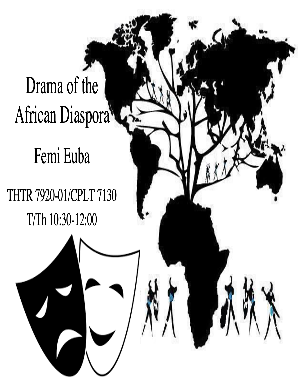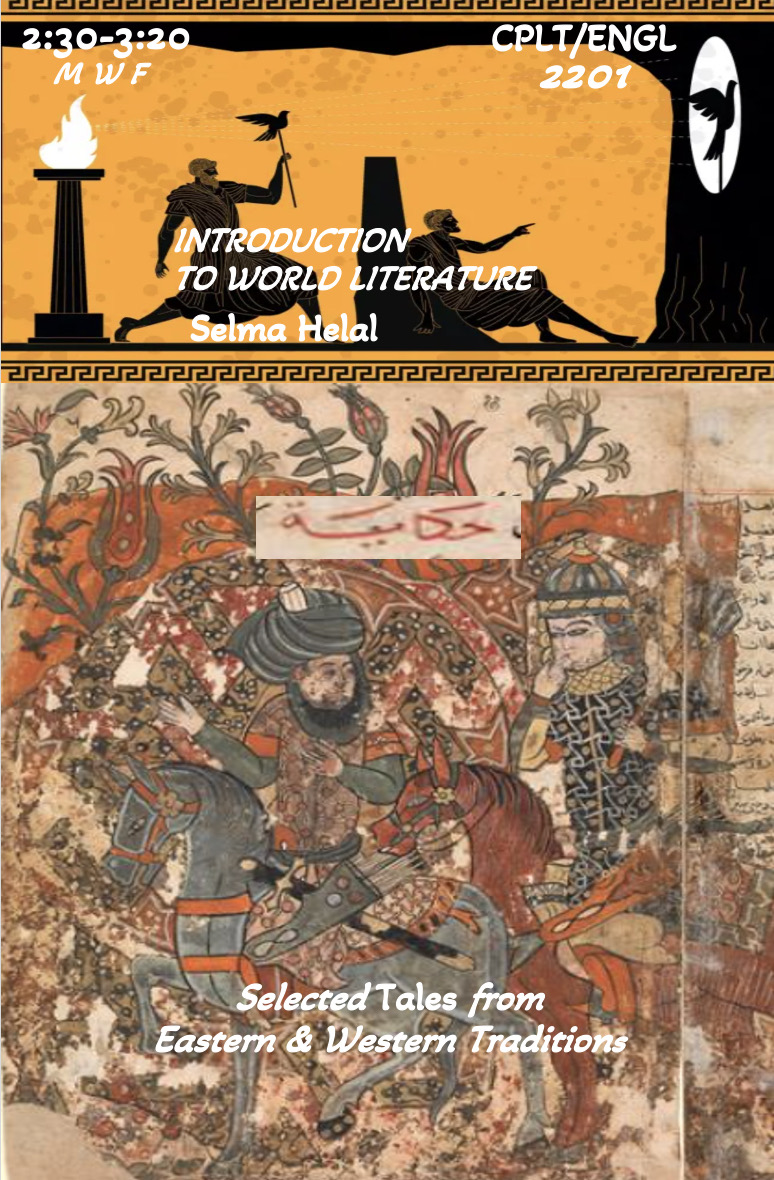2025-2026 Courses
Spring 2026
Graduate Courses
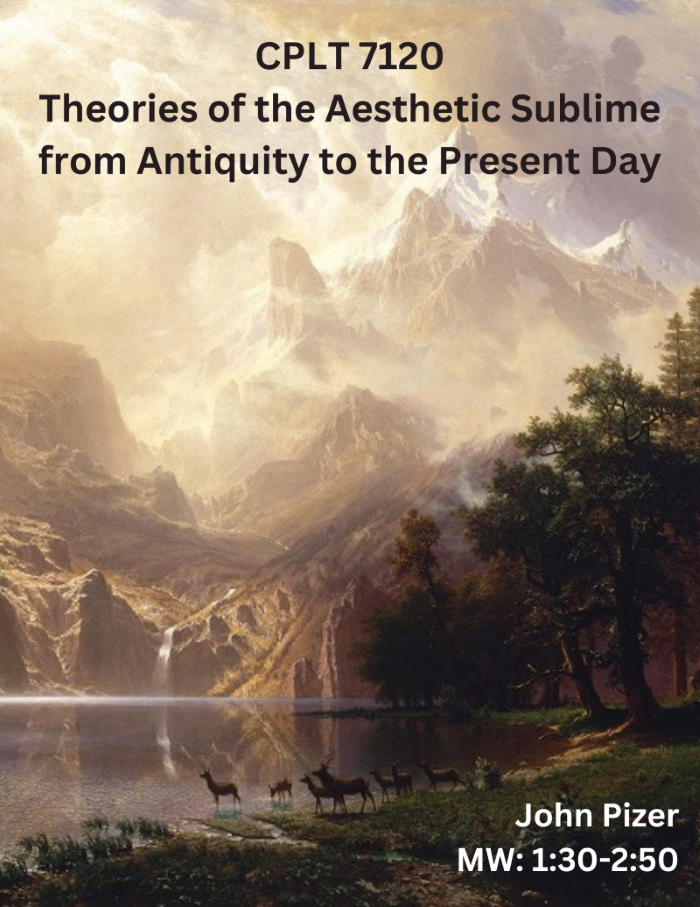
CPLT 7120: Theories of the Aesthetic Sublime from Antiquity to the Present Day
Instructor: John Pizer
Time: MW 1:30-2:50 p.m.
Common to almost all definitions of the aesthetic sublime is that it refers to a feeling of awe and veneration triggered by a work of art. However, what brings about this sentiment has been the subject of widely divergent arguments. Longinus was the most famous figure from Antiquity to deal with this issue. He argued that the sublime was a feeling evoked by outstanding writing or discourse which makes careful use of rhetoric. Kant believed that the awe inspired by the sublime is rooted in a feeling of terror, but a terror experienced in quiet contemplation. Burke believed that a sublime work of art must be rooted in obscured perception, as in a painting where exalted natural objects are portrayed from a great distance or at least somewhat shrouded. More recent work focuses on the phenomenology and psychology of sublime sentiment. Our class will examine theories of the sublime from Antiquity to the present day and on multiple continents. The grade will be based on the conducting of one class by each student and a term research paper of some 20 pages. The two required texts are an anthology of writing on the sublime and a work which provides a broad historical overview of this subject.
 CPLT 7130: The Figure of the Priest Across Literary Traditions
CPLT 7130: The Figure of the Priest Across Literary Traditions
Instructor: Dr. Rosemary Peters-Hill
Time: T 3:00-5:50 p.m.
The 1964 film adaptation of Jean Anouilh’s play Becket depicts an exasperated King Henry II of England, who famously exclaims, “Will no one rid me of this meddlesome priest?!” For Mary Doria Russell, the priest stands as a powerful statement about colonialism and trauma; for Émile Zola, he represents the irreconcilability of human drives and divine aspirations. For Robert Bresson, he is a cypher; for G.K. Chesterton, a detective with supernatural insights; and for Shūsaku Endō, a failed martyrdom. What no author has done so far is, in fact, to rid literature of the figure of the priest, meddlesome or otherwise. In this course we will discuss representations of literary priests as consecrated bodies and susceptible ones, as emissaries of moral law and of moral reasoning, as figures of singularity and of contradiction. We will read across literary traditions, including French, American, British, Japanese, Italian, Senegalese, and Russian, discussing how authors portray the dramatis personae of Catholic, Orthodox, Muslim, and Anglican religious leaders, in the context of their time, literary tradition, the authors’ political situations, and any contemporary artistic movements. Required texts : Jean Anouilh, Becket Mariama Bâ, So Long A Letter Georges Bernanos, Diary of a Country Priest Willa Cather, Death Comes for the Archbishop G. K. Chesterton, Father Brown (selected stories) Shūsaku Endō, Silence Graham Greene, Monsignor Quixote Giovannino Guareschi, Don Camillo (selections) James Runcie, Grantchester (selections) Mary Doria Russell, The Sparrow Émile Zola, The Sin of Father Mouret Films : Xavier Beauvois, Des hommes et des dieux (Of Gods and Men) Robert Bresson, Diary of a Country Priest Alfred Hitchcock, I Confess! Roland Joffé, The Mission Martin Scorsese, Silence Adolph Zukor, Father Brown, Detective (TBD).
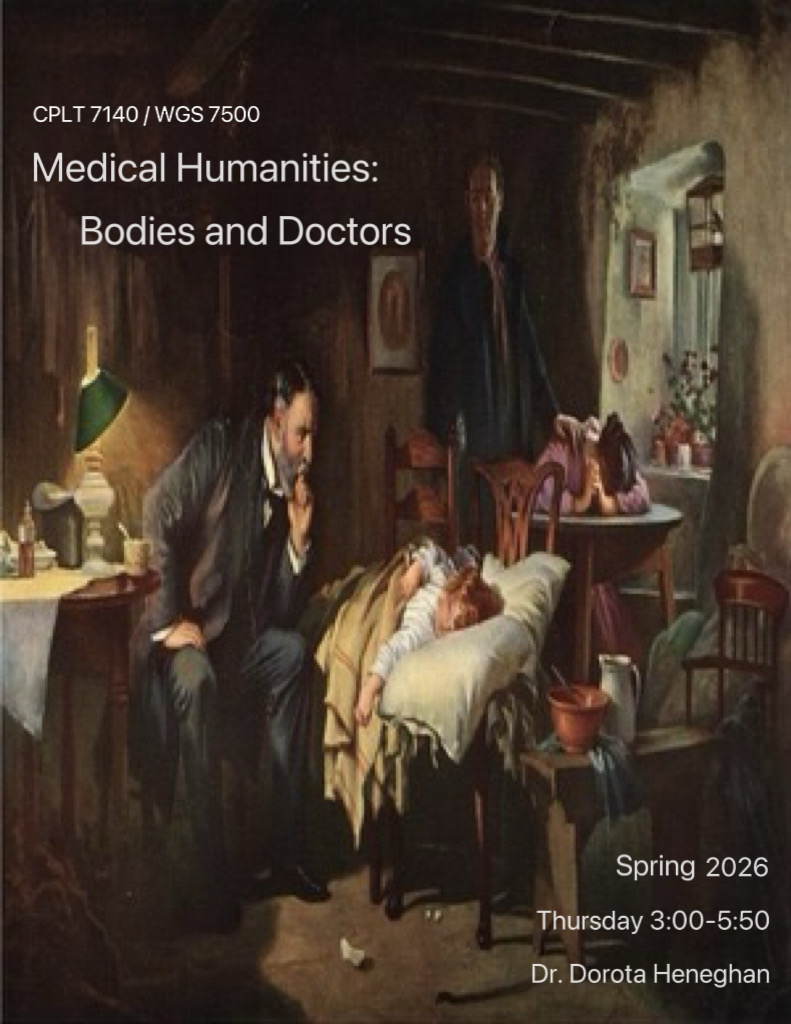
CPLT 7140/WGS 7500: Medical Humanities: Bodies and Doctors
Instructor: Dr. Dorota Heneghan
Time: Th 3:00-5:50 p.m.
In this seminar we will explore Medical Humanities as a discipline that cuts across traditional boundaries of academic fields and areas of expertise. We will focus on the role of literature, arts, and gender studies in our understanding of health and illness. We will discuss how artists (many health professionals themselves) used illness and loss as a metaphor for personal and broader social issues and how they linked medical treatment as remedies for improved national 'health'. We will also explore how artistic expressions of body and illness engage with and respond to medical discourses and intersect with gender, sexuality, class, and race on both sides of the Atlantic since the 1850s until present.
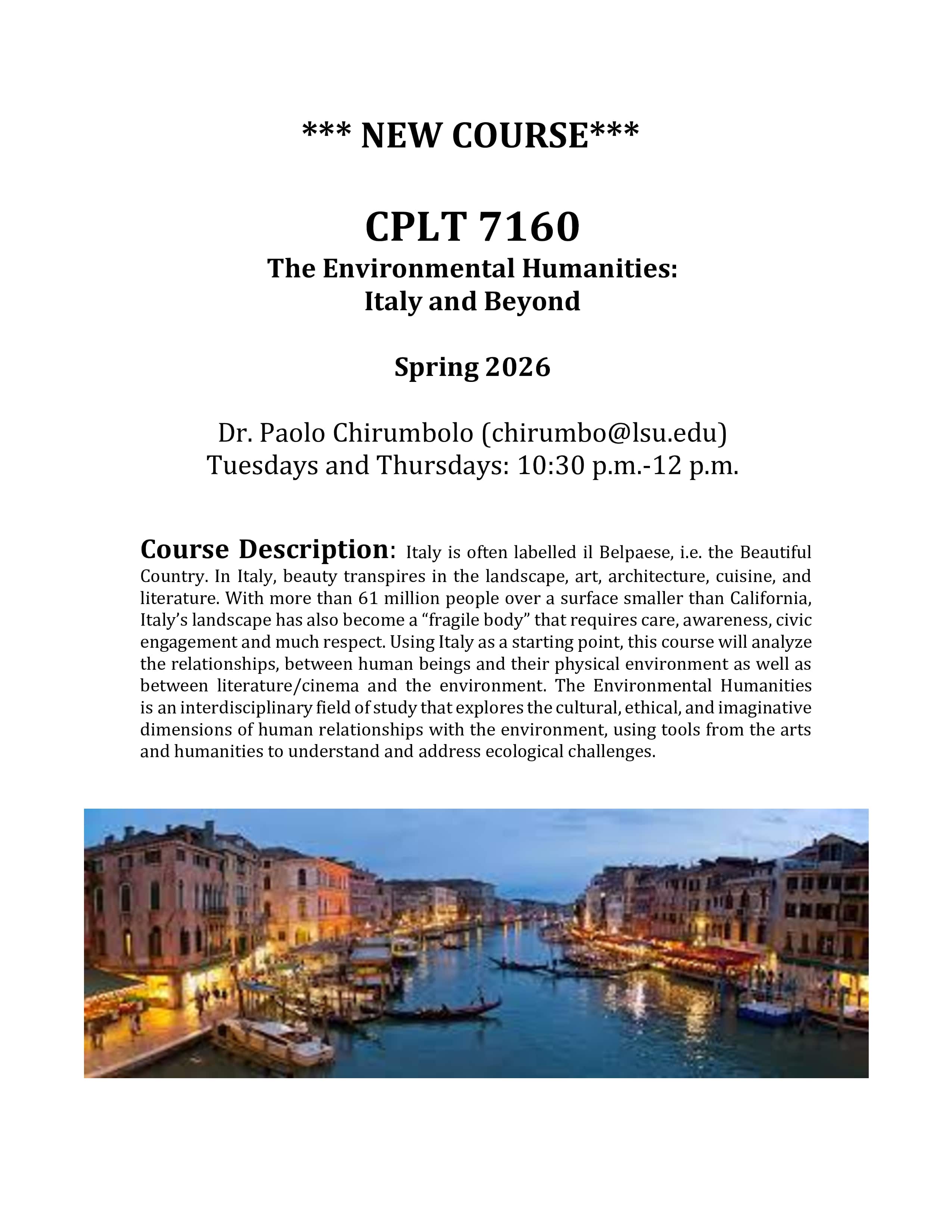
CPLT 7160: The Environmental Humanities: Italy and Beyond
Instructor: Dr. Paolo Chirumbolo
Time: T, Th 10:30-12 p.m.
Italy is often labelled il Belpaese, i.e. the Beautiful Country. In Italy, beauty transpires in the landscape, art, architecture, cuisine, and literature. With more than 61 million people over a surface smaller than California, Italy's landscape has also become a "fragile body" that requires care, awareness, civic engagement and much respect. Using Italy as a starting point, this course will analyze the relationships, between human beings and their physical environment as well as between literature/cinema and the environment. The Environmental Humanities is an interdisciplinary field of study that explores the cultural, ethical, and imaginative dimensions of human relationships with the environment, using tools from the arts and humanities to understand and address ecological challenges.
Undergraduate Courses
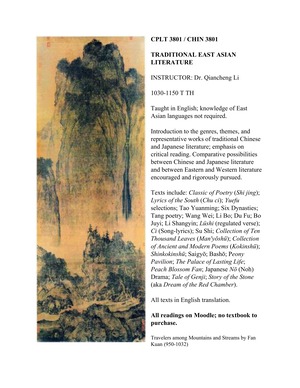 CPLT 3801/CHIN 3801: Traditional East Asian Literature
CPLT 3801/CHIN 3801: Traditional East Asian Literature
Instructor: Prof. Qiancheng Li
Time: T, TH 10:30-11:50 a.m.
Taught in English; knowledge of East Asian languages not required. Introduction to the genres, themes, and representative works of traditional Chinese and Japanese literature; emphasis on critical reading. Comparative possibilities between Chinese and Japanese literature and between Eastern and Western literature encouraged and rigorously pursued. Texts include: Classic of Poetry (Shi jing); Lyrics of the South (Chu ci); Yuefu selections; Tao Yuanming; Six Dynasties; Tang poetry; Wang Wei; Li Bo; Du Fu; Bo Juyi; Li Shangyin; Lüshi (regulated verse); Ci (Song-lyrics); Su Shi; Collection of Ten Thousand Leaves (Man'yoshu); Collection of Ancient and Modern Poems (Kokinshu); Shinkokinshü; Saigys; Basho; Peony Pavilion; The Palace of Lasting Life; Peach Blossom Fan; Japanese No (Noh) Drama; Tale of Genji; Story of the Stone (aka Dream of the Red Chamber). All texts in English translation.
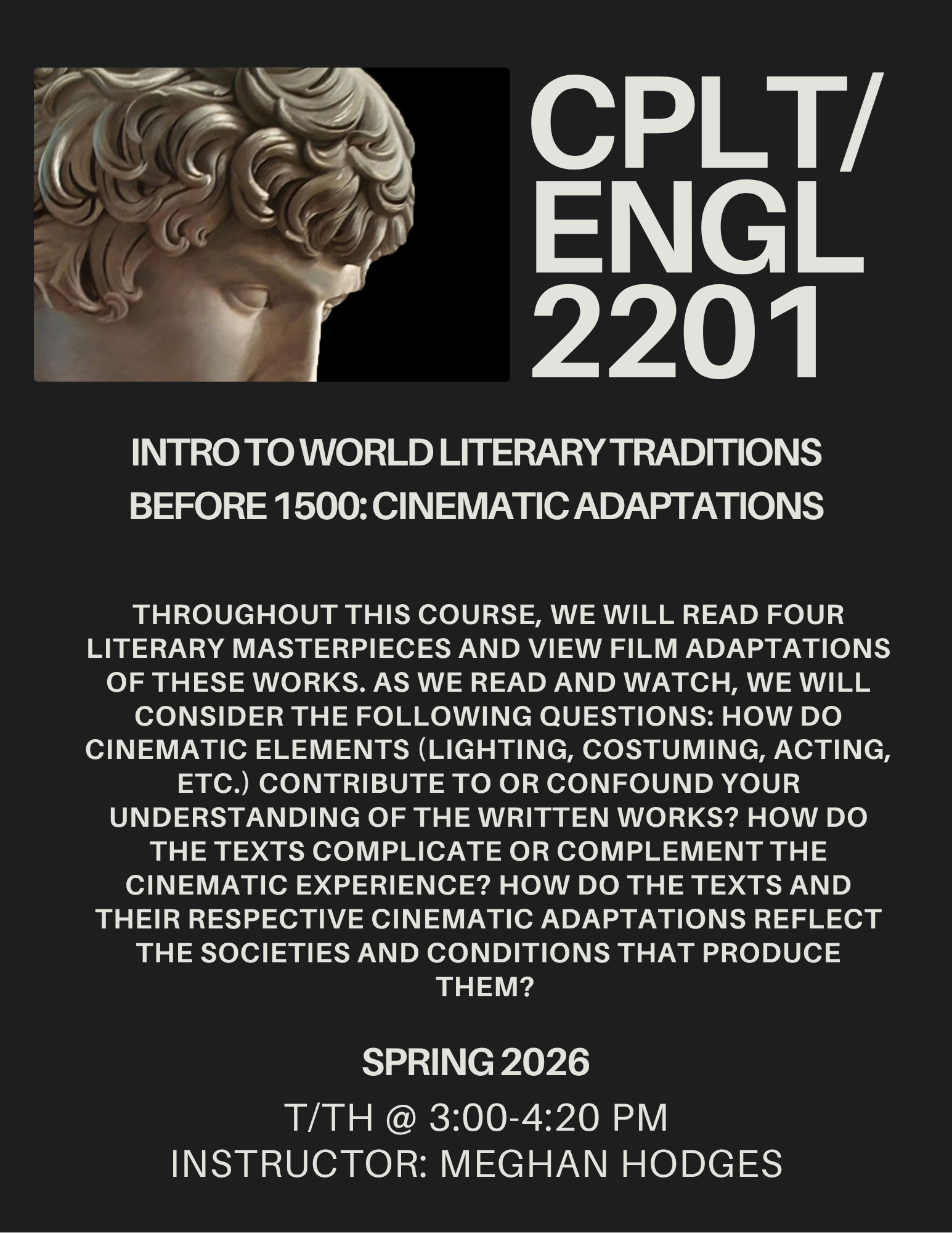
CPLT 2201/ENGL 2201: Introduction to World Literary Traditions Before 1500: Cinematic Adaptations
Instructor: Meghan Hodges
Time: T, Th 3:00-4:20 p.m.
Throughout this course, we will read four literary masterpieces and view film adaptations of these works. As we read and watch, we will consider the following questions: How do cinematic elements (lighting, costuming, acting, etc.) contribute to or confound your understanding of the written works? How do the texts complicate or complement the cinematic experience? How do the texts and their respective cinematic adaptations reflect the societies and conditions that produce them?
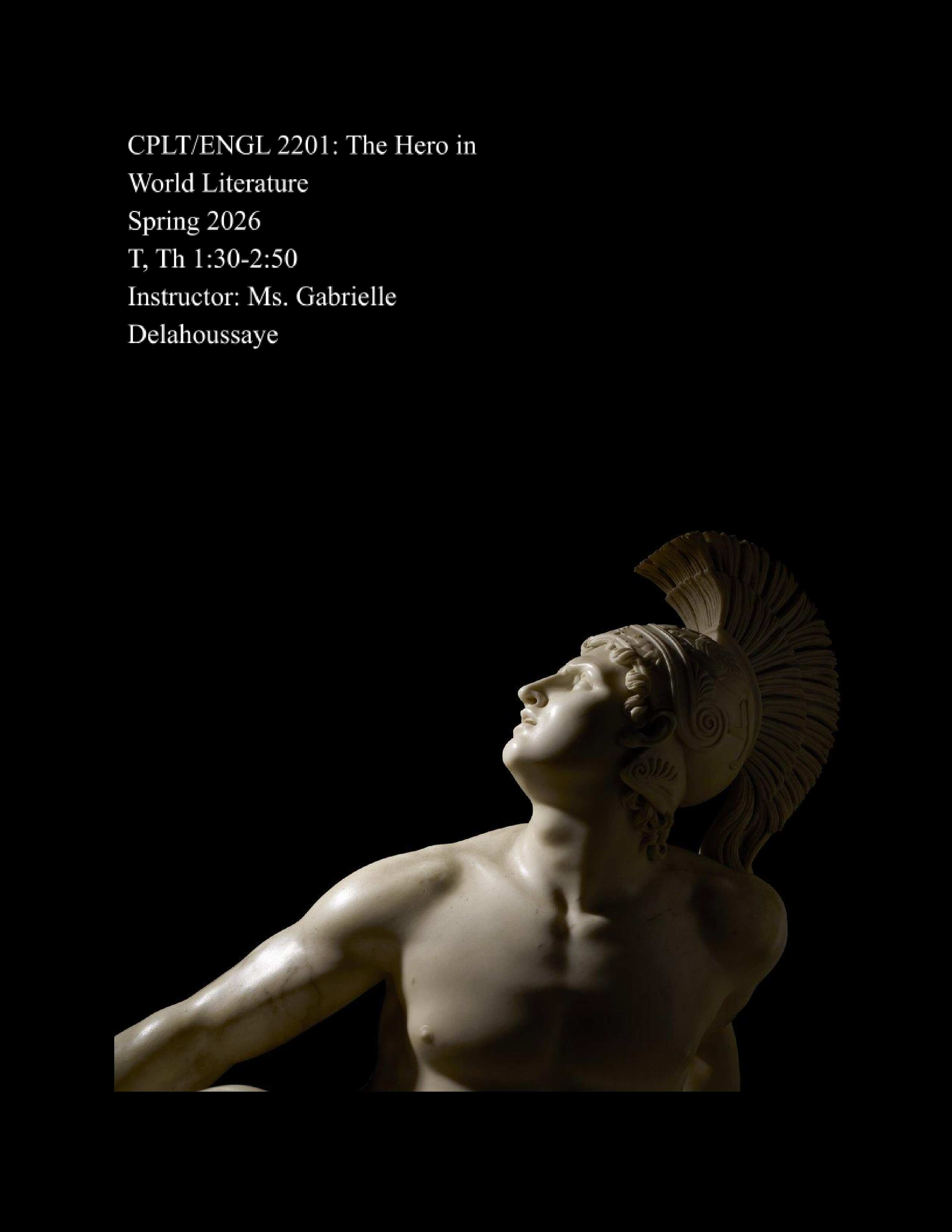
CPLT 2201/ENGL 2201: The Hero in World Literature
Instructor: Gabrielle Delahoussaye
Time: T, TH 1:30-2:50 p.m.
In this course, students will be introduced to classic texts from the Western canon, including Homer’s Iliad, Ovid’s Metamorphoses, and Shakespeare’s Hamlet. Our thematic focus will be heroism, or the ideals of courage and excellence that shape life and literature. Students will be asked to compare and contrast various cultural, historical, and ethical frameworks. We will ask ourselves how Achilles’ brand of heroism might differ, for example, from Gawain’s or even from that of his fellow Greeks. Special attention will be paid to the ways in which heroic characters uphold but also defy the behavioral codes impressed on them. Emphasis throughout will be on developing the ability to think independently, cogently, and decisively about fundamental issues that arise from reflection on the nature of human existence.
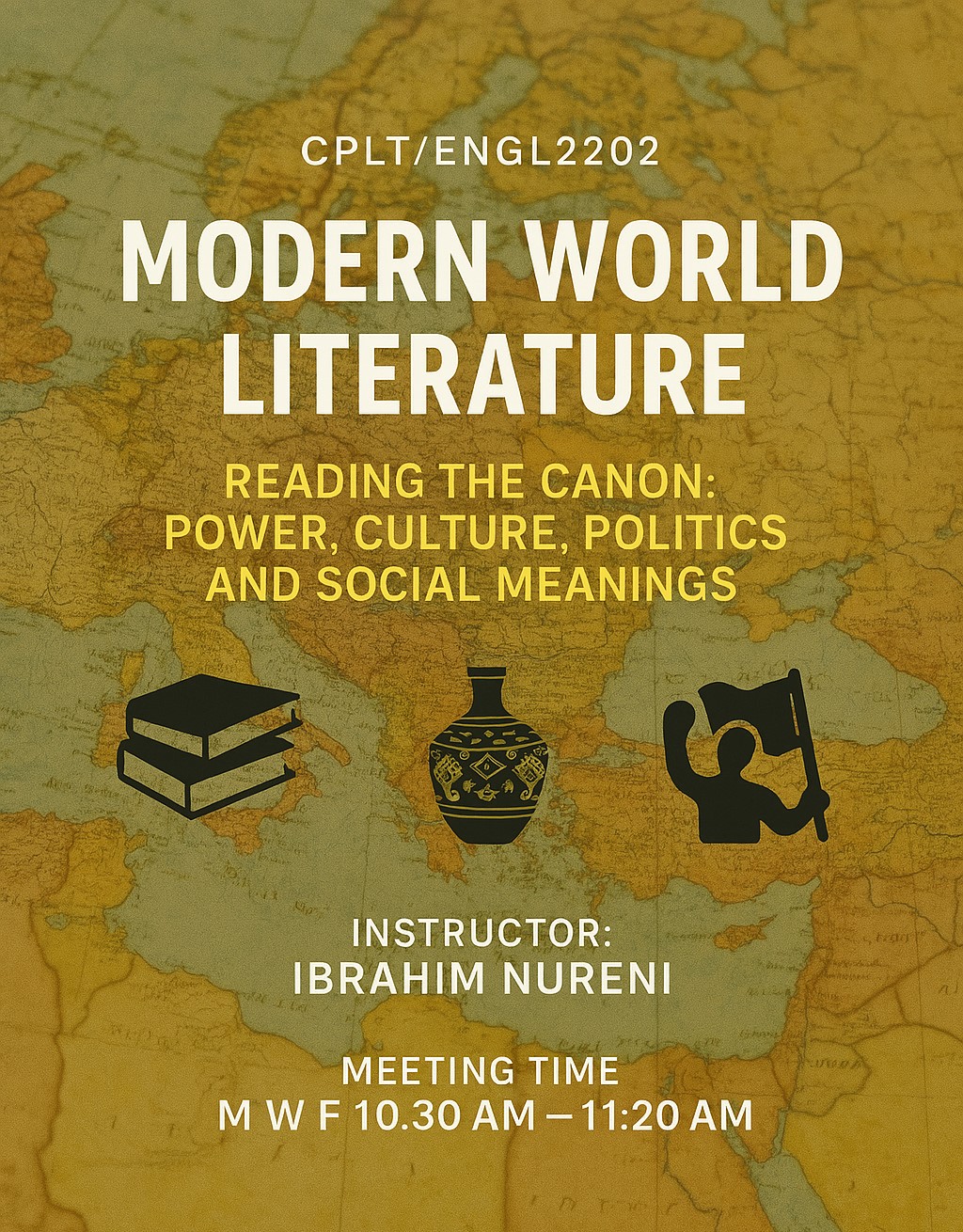
CPLT 2202/ENGL 2202: Introduction to Modern World Literature: Reading the Canon: Power, Culture, Politics, and Social Meanings
Instructor: Ibrahim Nureni
Time: MWF 10:30-11:20 a.m.
This is a service-learning course that combines literary study with community engagement. As we explore world literature, students will participate in community-based projects that connect course themes to real-world issues so as to encourage reflection on the role of literature in society. In this course, we will focus on close reading and analysis of canonical texts (genres include poetry, prose, and drama) from Africa, Asia, and Europe. Through our readings, we will examine themes such as politics, gender, and cultural conflict, all in their social, historical, and political contexts. Some readings will include (but are not limited to) the texts of William Shakespeare, Samuel Beckett, Lu Xun, and Okot p’Bitek. In addition to studying their literary works, we will read Olukorede S. Yishau’s After the End, using it to explore what makes a text canonical and whether this text might be considered for inclusion in the future. The writer will possibly visit LSU for a “Meet the Author” event. The goal is to offer students the unique chance to engage in conversation about the text, the author’s process, and the broader questions we are tackling in class. Throughout the course, we will ask: What is canon? What makes a text canonical? Who decides what belongs in the canon? And how do these decisions shape our understanding of world literature? By the end of the semester, I expect students to have developed essential skills for analyzing literature from various cultures and regions, to evaluate what it means for a text to be considered “canonical,” and to gain hands-on experience in applying literary ideas beyond the classroom.
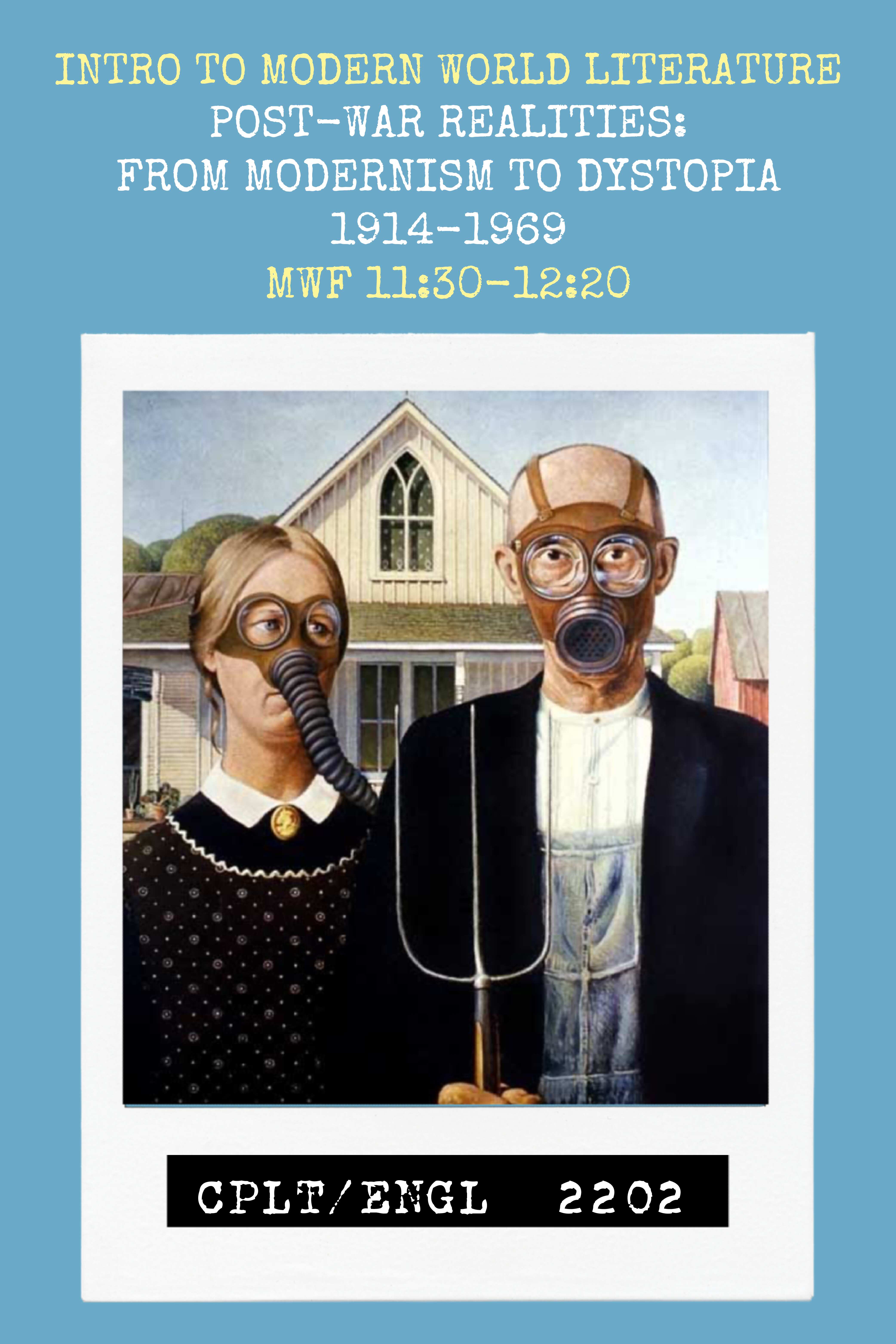 CPLT 2202/ENGL 2202: Introduction to Modern World Literature: Post-War Realities:
From Modernism to Dystopia 1914–1969
CPLT 2202/ENGL 2202: Introduction to Modern World Literature: Post-War Realities:
From Modernism to Dystopia 1914–1969
Instructor: Gabrielle Bologna
Time: MWF 11:30-12:20 p.m.
Here, we will encounter twentieth-century literature that bridges the gap between
fiction and reality. From robot rebellions to weapons of mass destruction, visions
of the developing digital world range from cautionary, futuristic tales to reflections
on very real events.
In this course, we explore “the age of anxiety” as it is written across Eastern and
Western works, examining how such widespread disillusionment with humanity’s growing
power to create and destroy is foreshadowed, relayed, and reimagined in the literary
space. As we journey through the imaginary, the real, and the hyperreal, our focus
will turn toward a broader discourse surrounding how these images of crisis, evolution,
and revolution shape and challenge our views of world literature and history.
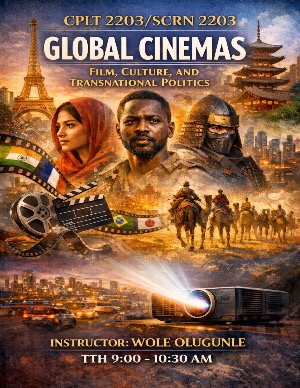 CPLT 2203/SCRN 2203: Global Cinemas: Film, Culture, and Transnational Politics
CPLT 2203/SCRN 2203: Global Cinemas: Film, Culture, and Transnational Politics
Instructor: Wọlé Olúgúnlẹ̀
Time: T, Th 9:00-10:30 a.m.
This applied-learning course explores Global Cinemas through films, documentaries, and music videos from Asia, the Caribbean, and Africa. The course blends film analysis with hands-on creative practice where students explore the historical, social, and political contexts surrounding each canonical text to be studied in class and how they help us understand major thematic concerns such as culture, identity crisis, exile, gender, and many others across diverse global contexts. The course encourages comparative and interdisciplinary approaches by incorporating ideas from political science, cultural studies, sociology, anthropology, philosophy, and other disciplines of the humanities while focusing on how filmmakers negotiate political and cultural differences, challenge stereotypes, and participate in transnational political and cultural dialogue. Students will engage in weekly screenings, readings, discussions, and creative assignments, producing short video essays uploaded to personal YouTube channels (public or unlisted). Through these projects, students will develop critical media literacy alongside practical digital storytelling skills. Screen materials include works by Ang Lee, Ashutosh Gowariker, Perry Henzell, Ousmane Sembène, Tunde Kelani, and cultural icons such as Bob Marley and Fela Kuti. By the end of the course, students will gain a deeper understanding of global cinematic cultures and the ways screen media shape—and are shaped by—historical, political, and cultural forces worldwide.
Fall 2025
Graduate Courses
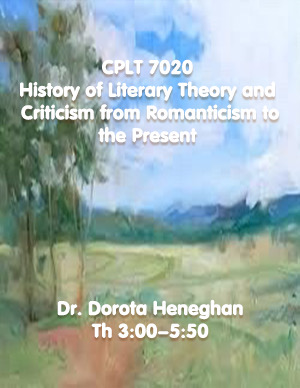
CPLT 7020: History of Literary Theory and Criticism from Romanticism to the Present
Instructor: Dr. Dorota Heneghan
Time: Th 3:00-5:50 p.m.
Course Objectives: 1) To study the history of Western Literary Criticism and Theory from the late Nineteenth Century to the Present, considering the changes in literary thought resulting from an increasingly global cultural perspective; 2) To develop students’ research and writing skills and help them understand the conventions and requirements of academic discourse on literature: 3) To facilitate students’ cultivation of their talents as creative readers and writers. Topics Addressed in Modern and Contemporary Schools and Movements: The Canon; Formalism; Structuralism, Poetry; Narrative Theory; Media, Culture and Post-Modernism; Deconstruction and Post-Structuralism; Feminism, Gender Studies and Queer Theory; Marxism, New Historicism and Literary History; Phenomenology, Hermeneutics, and Reader-Response Theory; Postcolonial Theory and Criticism; Race and Ethnicity; Psychoanalysis and its Critics; Ideology and Hegemony; Anthropological Approaches to Literature; Popular Culture; Media Studies; Digital Humanities.
CPLT 7130/THTR 7920: Drama of the African Diaspora
Instructor: Dr. Femi Euba
Time: T, Th 10:30-12:00 p.m.
A study of the dramatic and theatrical expressions of the black cultures of the New World (North and South America, and the Caribbean), identifying, where possible, comparable connections with African counterparts. Works include those by August Wilson, Suzan-Lori Parks, Aime Cesaire, Abdias do Nascimento, and Derek Walcott.
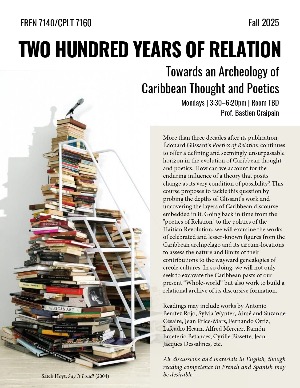 CPLT 7160/FREN 7140: Two Hundred Years of Relation: Towards an Archeology of Caribbean
Thought and Poetics
CPLT 7160/FREN 7140: Two Hundred Years of Relation: Towards an Archeology of Caribbean
Thought and Poetics
Instructor: Prof. Bastien Craipain
Time: M 3:30-6:20 p.m.
More than three decades after its publication, Édouard Glissant’s Poetics of Relation continues to offer a defining and seemingly unsurpassable horizon in the evolution of Caribbean thought and poetics. How can we account for the enduring influence of a theory that posits change as its very condition of possibility? This course proposes to tackle this question by probing the depths of Glissant’s work and uncovering the layers of Caribbean discourse embedded in it. Going back in time from the "poetics of Relation" to the politics of the Haitian Revolution, we will examine the works of celebrated and lesser-known figures from the Caribbean archipelago and its circum-locations to assess the nature and limits of their contributions to the wayward genealogies of creole cultures. In so doing, we will not only seek to excavate the Caribbean pasts of our present “Whole-world” but also work to build a relational archive of its discursive formation. Readings may include works by Antonio Benítez Rojo, Sylvia Wynter, Aimé and Suzanne Césaire, Jean Price-Mars, Fernando Ortiz, Lafcadio Hearn, Alfred Mercier, Ramón Emeterio Betances, Cyrille Bissette, Jean-Jacques Dessalines, etc. All discussions and materials in English, though reading competence in French and Spanish may be desirable.
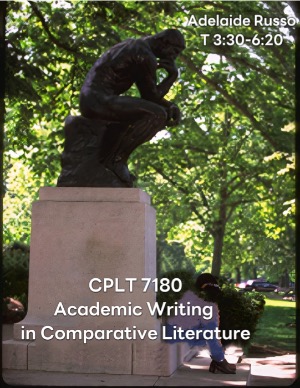
CPLT 7180: Academic Writing in Comparative Literature
Instructor: Dr. Adelaide Russo
Time: T 3:30-6:20 p.m.
The Academic Writing Seminar in Comparative Literature is for PhD students who are
preparing to write their prospectus or dissertation. Over the course of the semester,
your classmates and I will discuss your work and provide constructive feedback. We
will also study a variety of exemplary models of academic writing in order to think
about what makes a good prospectus, dissertation, book, etc. We will also discuss
other major scholarly genres that are vital in the academic world: the conference
abstract, the conference paper, the book review, and the article.
Undergraduate Courses
CPLT 2201/ENGL 2201: Introduction to World Literature: Selected Tales from Eastern and Western Traditions
Instructor: Selma Helal
Time: MWF 2:30-3:20 p.m.
This course offers to explore the art of storytelling through a selection of allegorical tales pertaining to western and eastern traditions. Students will come to see the power of storytelling in foregrounding teachings of ethical and philosophical dimensions across cultures. They will come to see tales as a space for meaning to grow and metamorphose into a symbolic system of reference. The overarching theme of journey in the selection of stories can be recognized through such subthemes as migration/pilgrimage, exile, and love. Some of the readings include allegorical tales by Plato, Ibn al-Muqaffa, Boccaccio, and Suhrawardi.
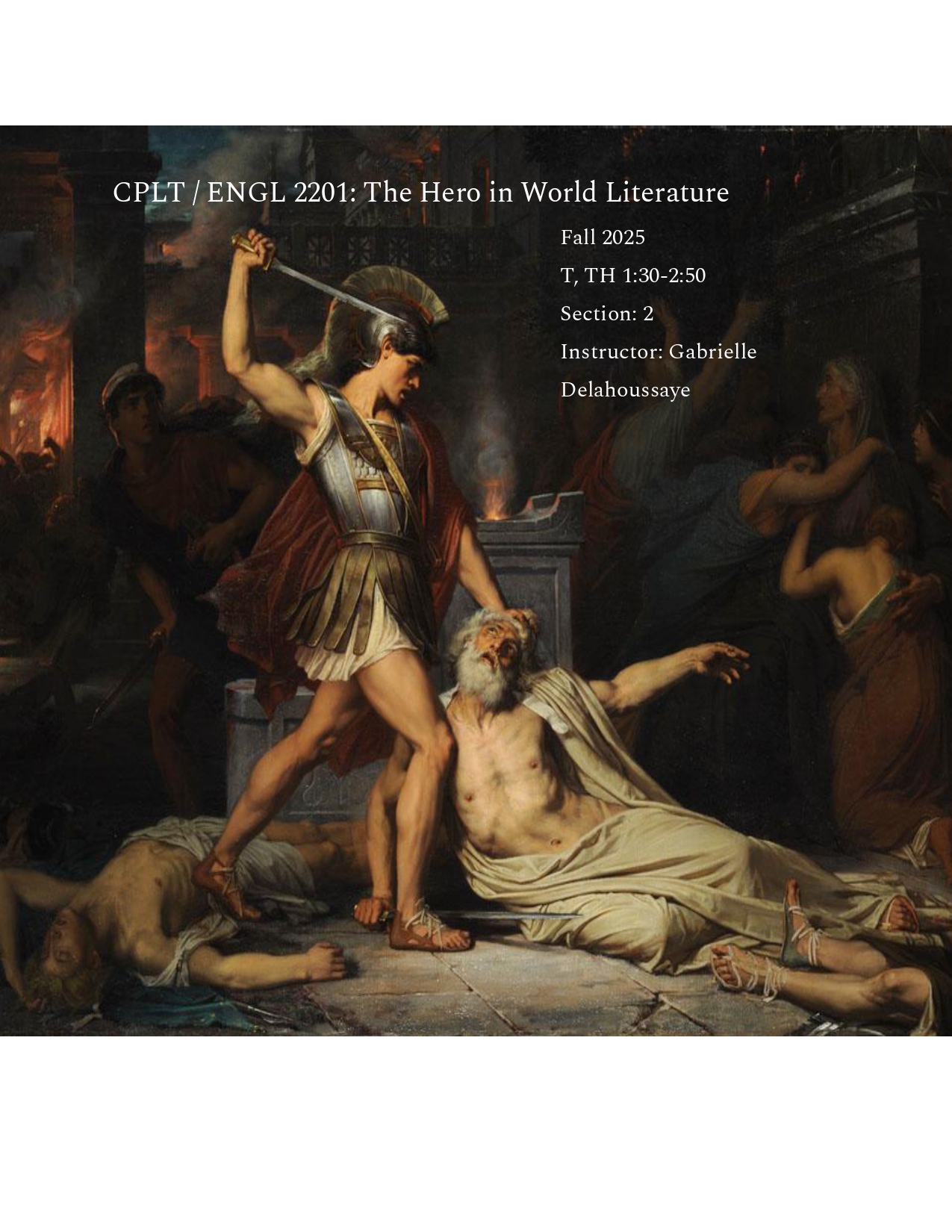 CPLT 2201/ENGL 2201: The Hero in World Literature
CPLT 2201/ENGL 2201: The Hero in World Literature
Instructor: Gabrielle Delahoussaye
Time: T, TH 1:30-2:50 p.m.
This course will examine the concept of heroism, as it shapes Western literature from Ancient to Early Modern times. Together, we will discuss ideals of courage and excellence belonging to various cultural, historical, and ethical frameworks. Through encounters with works by Homer, Sophocles, and Shakespeare, we will develop an understanding of what it means to live an exemplary life. Special attention will be paid to the ways in which heroes both uphold and defy the behavioral codes prescribed to them by the societies in which they live. Emphasis throughout will be upon developing the ability to think independently, cogently, and decisively about fundamental issues that arise from reflection on the nature of human existence.
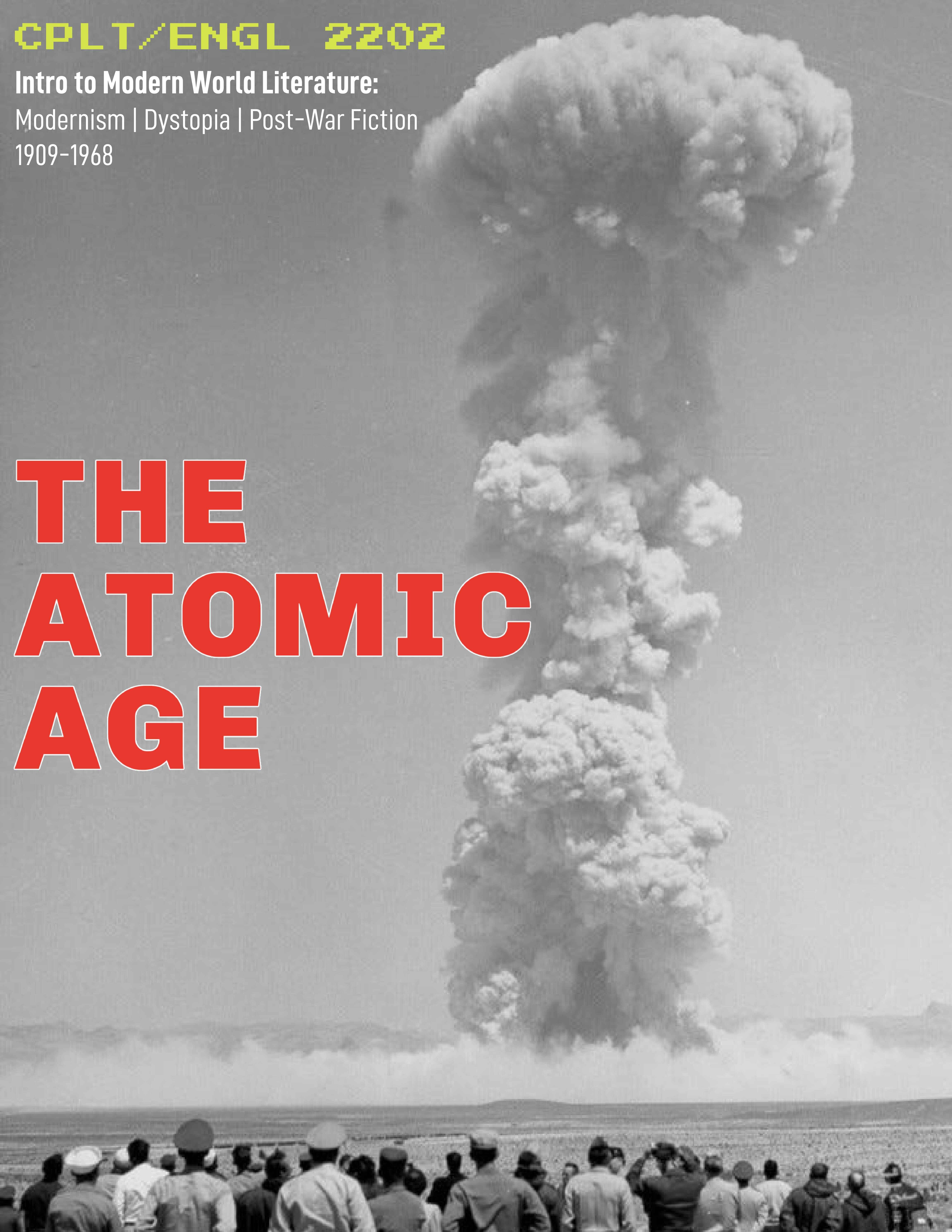 CPLT 2202/ENGL 2202: Introduction to Modern World Literature: The Atomic Age
CPLT 2202/ENGL 2202: Introduction to Modern World Literature: The Atomic Age
Instructor: Gabrielle Bologna
Time: MWF 11:30-12:20 p.m.
In this course, we will read our way through the first half of the twentieth century with literature bridging the gap between the imaginary and the real. Moving across genres, from the dystopian to the historical novel, we will encounter visions of post-war environments, technological advances, oppressive regimes, and normative change. As we engage with material authored in the wake of Imperial collapse and increasing international conflict, our focus turns toward a broader question surrounding themes of crisis and revolution, reflecting on how this literary era shapes and challenges our understandings of past, present, and future.
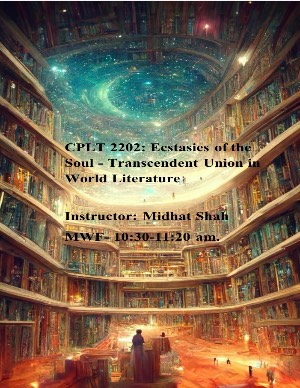
CPLT 2202/ENGL 2202: Ecstasies of the Soul - Transcendent Union in World Literature
Instructor: Midhat Shah
Time: MWF 10:30-11:20 a.m.
The concept of divine love or "عشق" remains a powerful literary force from the modern
era to the present. This course examines how writers have expressed mystical consciousness,
spiritual longing, and divine union in an age of increasing rationalism and secularization.
We will explore how the language of transcendent love evolved from 1650 onward while
maintaining connections to earlier mystical traditions.
Through a comparative study of texts from Western Romanticism, American Transcendentalism,
and Eastern spiritual traditions, we will analyze expressions of ecstatic devotion,
spiritual displacement, and the pursuit of union with the beloved. Special attention
will be given to Southeast Asian Sufi poets such as Bulleh Shah (1680-1757) and other
influential mystics from the region. Additional authors may include William Blake,
Rabindranath Tagore, and contemporary spiritual writers.
Students will engage with these works through close textual analysis while considering
their historical and cultural contexts, developing a nuanced understanding of how
divine love has inspired literary creation across boundaries of time, tradition, and
culture.
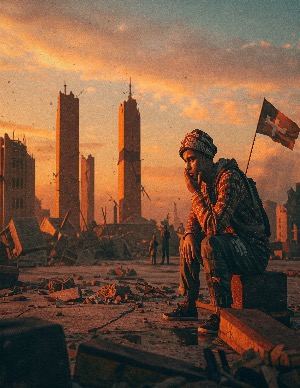 CPLT 2203/SCRN 2203: Global Cinemas: Cinematic Representations of Neocolonialism,
Aesthetics, and Autocriticism
CPLT 2203/SCRN 2203: Global Cinemas: Cinematic Representations of Neocolonialism,
Aesthetics, and Autocriticism
Instructor : Wolé Olúgúnlè
Time: T, TH 09:00-10:30 a.m.
This course explores how filmmakers, writers, and musicians from Africa, Asia, and the Caribbean represent neocolonialism through aesthetic strategies and acts of autocriticism. It engages with postcolonial and decolonial perspectives, cinematic analysis, and literary interpretation to understand how cultural producers critique both colonial residues and internal contradictions within postcolonial societies. The course foregrounds interdisciplinary approaches, blending film and documentary studies, literature, and political philosophy. This course is open to students who are interested in films, global politics, social justice, and cultural studies. We will study the works of such filmmakers and writers as Ang Lee, Joshua Oppenheimer, Ashutosh Gowariker, Bong Joon-ho, Raoul Peck, Bob Marley, Ousmane Sembène, Tunde Kilani, Fela Kuti, and more.
